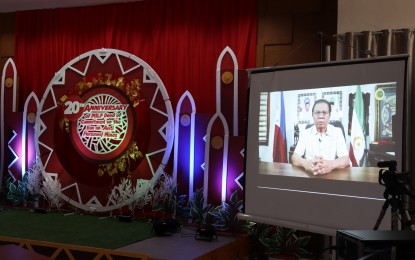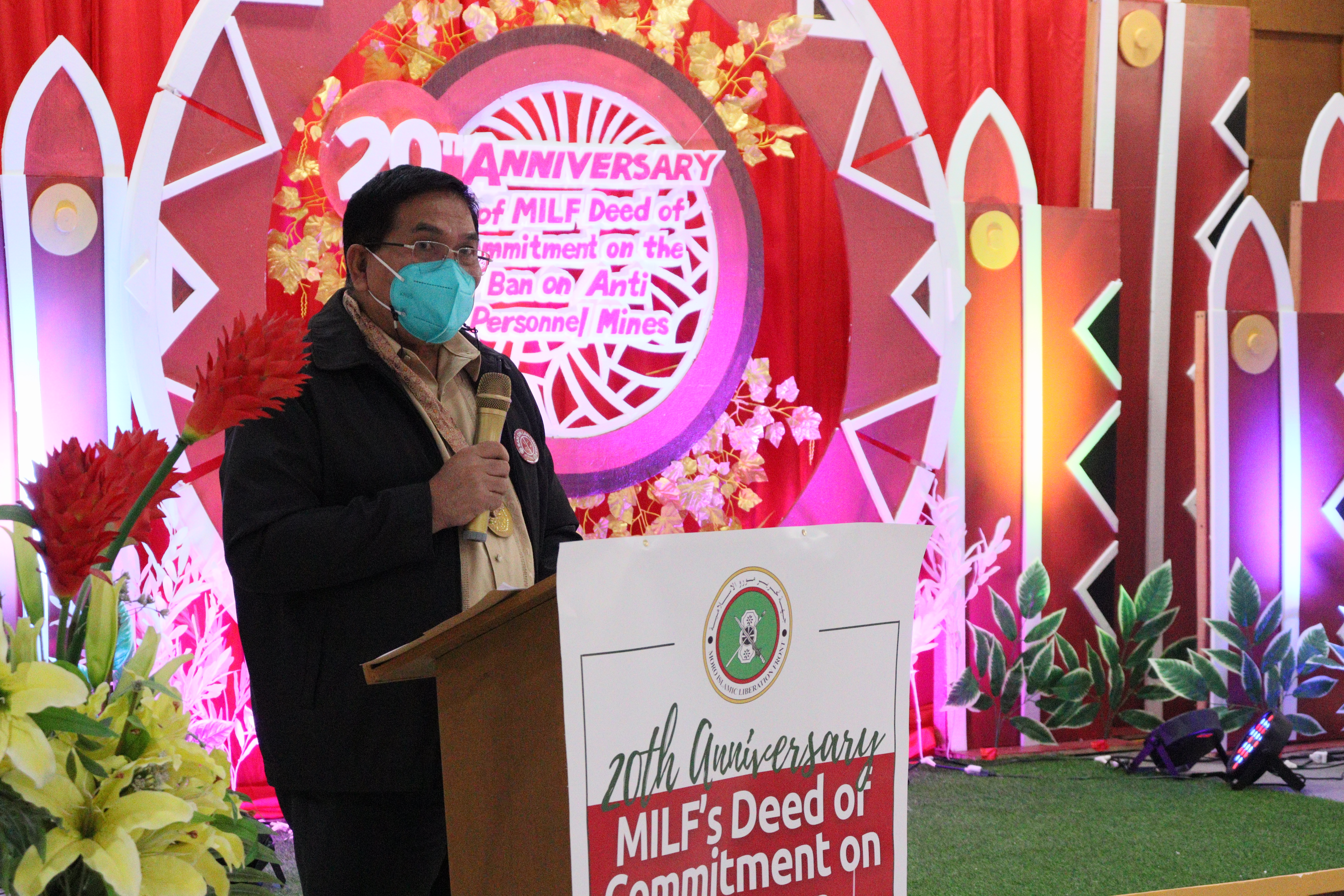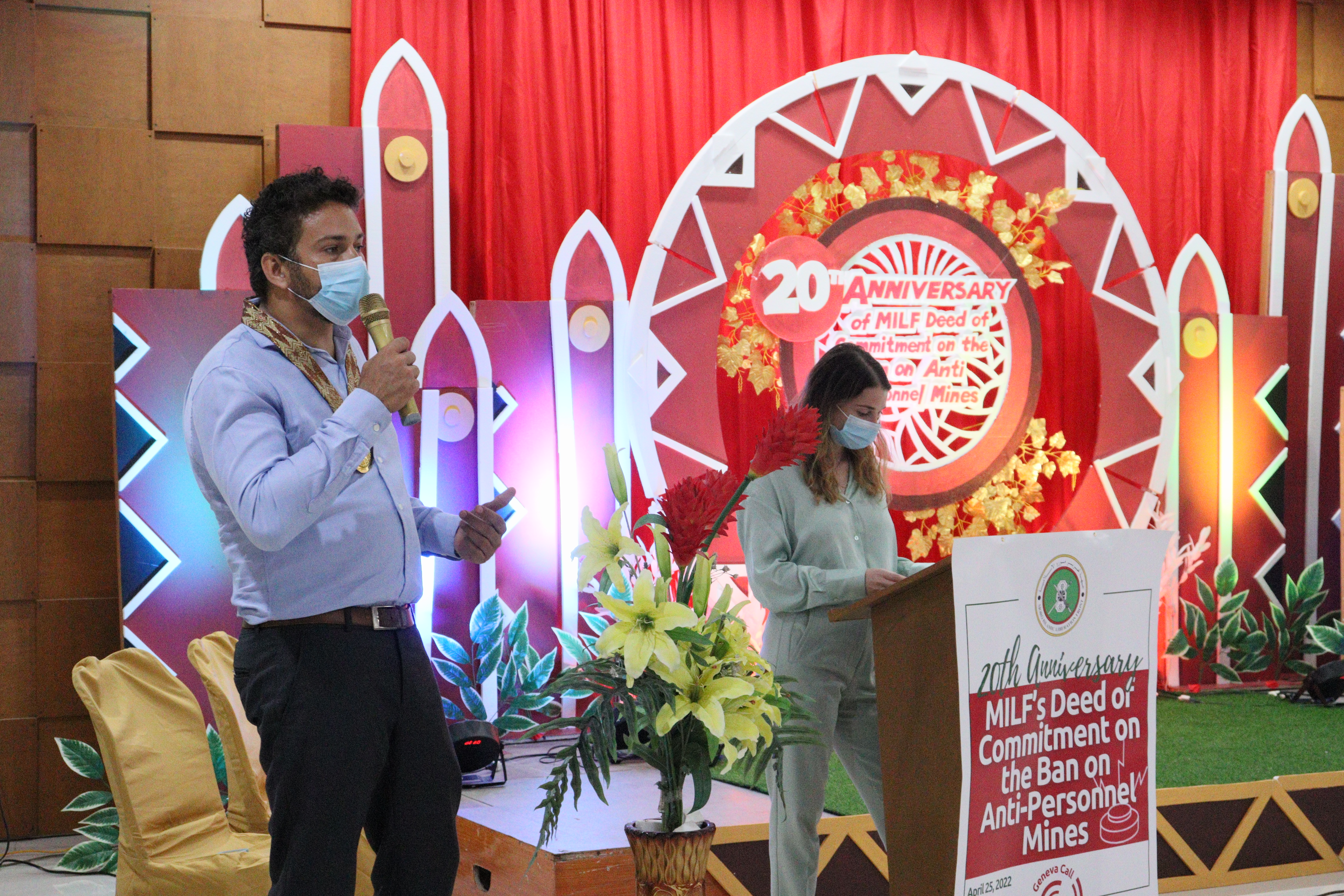From the Philippine News Agency (Apr 30, 2022): MILF renews commitment vs. anti-personnel mines (By Lade Jean Kabagani)

VOW. Moro Islamic Liberation Front Chair and Bangsamoro Chief Minister Ahod Balawag Ebrahim assures to uphold the commitment to the total ban on anti-personnel mines during a dialogue with non-government organization Geneva Call Philippines on April 25, 2022. He said they will ensure the protection of civilians from armed conflicts and will continue to respect the international humanitarian law. (Photo courtesy of Geneva Call Philippines)
The Moro Islamic Liberation Front (MILF) renewed its pledge to ensure the protection of all civilians from armed conflict and respect the international humanitarian law under the signed Deed of Commitment (DoC) for Adherence to a Total Ban on Anti-Personnel Mines (APMs).
The commitment follows a dialogue with Geneva Call Philippines, a neutral and impartial non-governmental organization that engages in with Armed Non-State Actors (ANSA), to commemorate the 20th anniversary of the DoC signing with the MILF on April 25.
In an email to the Philippine News Agency on Saturday, the Geneva Call said the DoC anniversary “highlighted the success of MILF’s commitment to respect international humanitarian norms”.
The Geneva Call hopes the gains of the DoC “will inspire other armed movements across the world to undertake similar commitments to protect civilians”.
It said the DoC allows ANSA to pledge to respect specific humanitarian norms and "be held accountable for their commitments as armed groups, otherwise excluded from signing international treaties prescribing humanitarian norms".
During the dialogue, MILF Chair Ahod Balawag Ebrahim said Moro’s adherence to the DoC remains.
Ebrahim, also the Chief Minister of the Bangsamoro Autonomous Region in Muslim Mindanao (BARMM), assured they will continue “to uphold the DoC to the highest degree”.
“We hold on to that DoC so dearly and we hope that more groups across the world adhere to the Geneva Call. We are one with the Geneva Call in prioritizing the protection of civilians,” Ebrahim vowed.
In the earlier days of the DoC signing, BARMM Senior Minister Abdulraof Macacua recalled that some MILF members rejected the commitment as it would limit their means to protect and defend their camps.
“But we properly explained to them that it is not only our enemies who will suffer, but also their families, the civilians, and fellow Bangsamoro,” he said during the dialogue.
In 2000, the Geneva Call supported MILF’s efforts to uphold humanitarian norms.
Since then, it has assisted MILF members to incorporate the DoC into their code of conduct with various technical advice and training conducted.
A complete package of communication materials was also handed over to the MILF members, making sure they will understand the content of the Deed.
As a result of the Geneva Call’s verification missions, MILF members willingly cooperated, and provides regular reports and explanations to allegations of non-compliance to the Deed and demonstrated accountability in implementing their commitment.

BARMM Senior Minister Abdulraof Macacua (Photo courtesy of Geneva Call Philippines)
Continuous
Macacua had assured the MILF will be part of the government’s efforts to convince other ANSA to refrain from using landmines.
Alex Virtanen, Geneva Call’s head of mission for the Philippines and Thailand, hopes that that MILF will inspire other ANSA “to make and abide by similar commitments”.
“MILF having this rich experience have very important roles to promote this kind of compliance, beyond BARMM, and beyond the Philippines,” Virtanen said in his e-mail.
Continuous
Macacua had assured the MILF will be part of the government’s efforts to convince other ANSA to refrain from using landmines.
Alex Virtanen, Geneva Call’s head of mission for the Philippines and Thailand, hopes that that MILF will inspire other ANSA “to make and abide by similar commitments”.
“MILF having this rich experience have very important roles to promote this kind of compliance, beyond BARMM, and beyond the Philippines,” Virtanen said in his e-mail.

Alex Virtanen, Geneva Call’s head of mission for the Philippines and Thailand (Photo courtesy of Geneva Call Philippines)
Banning APMs
The MILF, through its representative, lawyer Lanang Ali, signed the Geneva Call’s original DoC during an upsurge of conflicts in 2000.
On April 7, 2002, the group signed the revised DoC on a “Total Ban of APMs” in Maguindanao.
The DoC was received and signed by the Canton of Geneva on April 25, 2002.
Five years earlier, the international community adopted the 1997 Anti-Personnel Mine Ban Convention prohibiting the acquisition, production, stockpiling, and use of the weapons.
More than 160 states are party to the APM Ban Convention that went into effect in 1999.
The Philippines also has Republic Act 9851, An Act Defining and penalizing Crimes Against International Humanitarian Law, Genocide, and Other Crimes Against Humanity, Organizing Jurisdiction, Designating Special Courts and for Related Purposes, since 2009.
A provision under Section 4 states that combatants are prohibited from using APMs as it can cause "superfluous injury or unnecessary suffering or which are inherently indiscriminate.”
https://www.pna.gov.ph/articles/1173381
Banning APMs
The MILF, through its representative, lawyer Lanang Ali, signed the Geneva Call’s original DoC during an upsurge of conflicts in 2000.
On April 7, 2002, the group signed the revised DoC on a “Total Ban of APMs” in Maguindanao.
The DoC was received and signed by the Canton of Geneva on April 25, 2002.
Five years earlier, the international community adopted the 1997 Anti-Personnel Mine Ban Convention prohibiting the acquisition, production, stockpiling, and use of the weapons.
More than 160 states are party to the APM Ban Convention that went into effect in 1999.
The Philippines also has Republic Act 9851, An Act Defining and penalizing Crimes Against International Humanitarian Law, Genocide, and Other Crimes Against Humanity, Organizing Jurisdiction, Designating Special Courts and for Related Purposes, since 2009.
A provision under Section 4 states that combatants are prohibited from using APMs as it can cause "superfluous injury or unnecessary suffering or which are inherently indiscriminate.”
https://www.pna.gov.ph/articles/1173381

No comments:
Post a Comment
Note: Only a member of this blog may post a comment.